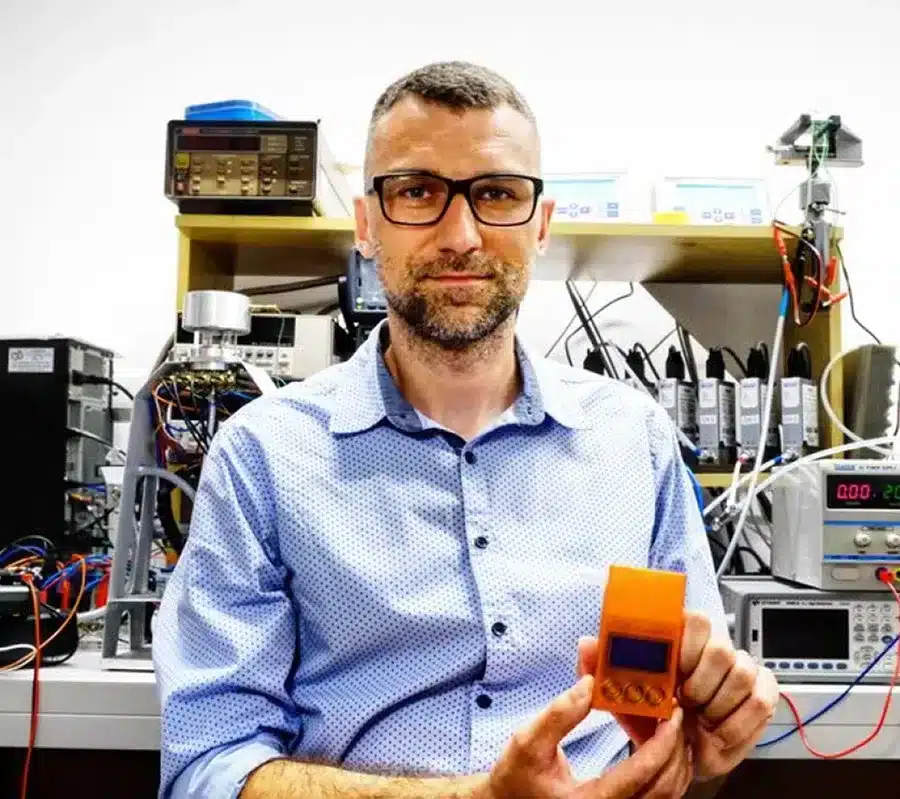Polish start-up Advanced Medical Equipment (AME), the brains behind the development of the Diabetomat, a revolutionary device for non-invasive blood sugar level testing, has signed an agreement to conduct clinical trials on a group of 120 diabetic patients.
These trials are a crucial element of certifying the Diabetomat as a medical device. On completion, IVD certification can be obtained, allowing sales to begin. The cost of the contract is PLN 560 thousand (approximately $148,204) and covers the execution of the process and documentation compilation (this figure does not cover the remuneration of medical establishments carrying out the studies).
“We estimate that this procedure will take several months, confirming the effectiveness of the technology developed and employed in the device. The state of the body can be evaluated based on various respiratory parameters. Diabetomat allows diabetic patients to monitor their sugar levels without the need for pricking,” says Prof. Artur Rydosz, President of AME S.A.
The Diabetomat is intended to be available not only in medical facilities, but also for patients’ daily home use. The innovative method of monitoring diabetes is based on the analysis of chemical compounds in exhaled air. Diabetes, a disease affecting approximately 3 million Poles and half a billion people worldwide, still remains one of the biggest challenges in medicine. The key issue is the need for regular blood sugar level monitoring, which involves invasive tests such as daily finger pricking.
In addition to this, the Polish company plans to use its patented technology to develop another medical device – this time for non-invasive diagnostics of heart failure (HF). The new CardioBreath device will enable the analysis of specific biomarkers in the breath (such as acetone or nitric oxide) which may signal deteriorating heart failure. The company hopes to introduce CardioBreath to the international market in the future, which could open new revenue streams and strengthen its position in the rapidly growing medtech market.
Moreover, CardioBreath is expected to produce rapid results, with the integration of artificial intelligence systems potentially allowing for automatic health warnings and reducing the need for costly hospitalization. As explained by Dr. Paweł Kacprzak, the R&D Director of AME, “Identifying biomarkers in breath could be a significant advancement in monitoring patients with heart failure and allow for quick interventions, even before symptoms requiring hospitalization appear.”
The CardioBreath project has gained the interest of government institutions and has been submitted to the EU SMART grant programme. This could accelerate research and developmental work. A specially selected research team will carry out the project, overseen by a national medical institute. As AME indicates, collaboration with the medical center will provide not only academic oversight but also patient tests to evaluate the correlation between breath biomarkers and the concentration of NT-proBNP – a peptide, the high level of which in the blood is a critical indicator of heart disease severity.
Heart failure is a problem affecting millions worldwide, including about 1.2 million Poles, where the percentage of patients increases to 10% among people over 70 years old. The high number of hospitalizations and the need for long-term care means that treatment costs are enormous – in Poland, exceeding PLN 1.6 billion ($423 million) annually and in Europe, this cost is estimated at around 30-40 billion euros. This burden poses a massive challenge for healthcare systems, and the development of modern diagnostic tools such as CardioBreath may help reduce these costs. According to Artur Rydosz, president of AME, a remote monitoring device could help patients monitor their health daily, reducing the need for hospitalizations, which account for 94% of the treatment costs for heart failure.
The demand for remote health monitoring is growing worldwide – especially in the context of chronic diseases such as heart failure. AME focuses on simple and convenient devices that aim to support patients in managing their health without the need for complicated procedures. As indicated by analysis, the global market for health monitoring medical devices could increase to tens of billions of dollars annually, which presents a significant opportunity for AME and its investors.
Source: https://ceo.com.pl/ame-rozpocznie-badania-kliniczne-diabetomatu-autorska-technologie-wykorzysta-w-badaniu-niewydolnosci-serca-z-urzadzeniem-cardio-breath-13899
